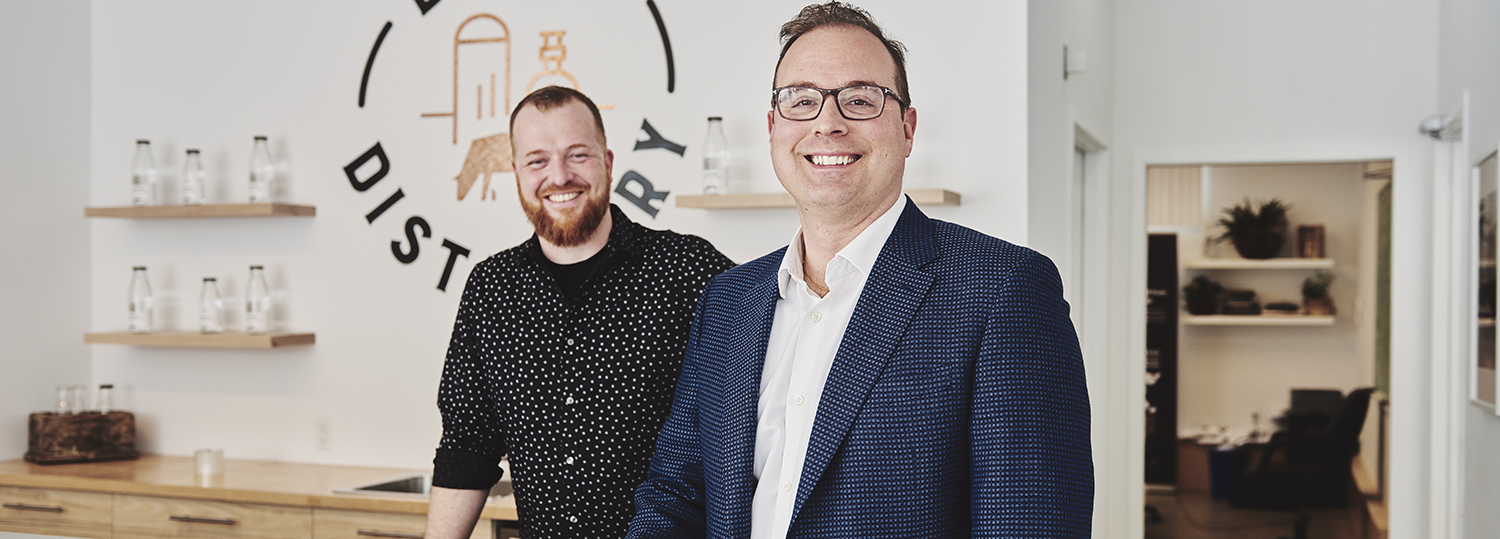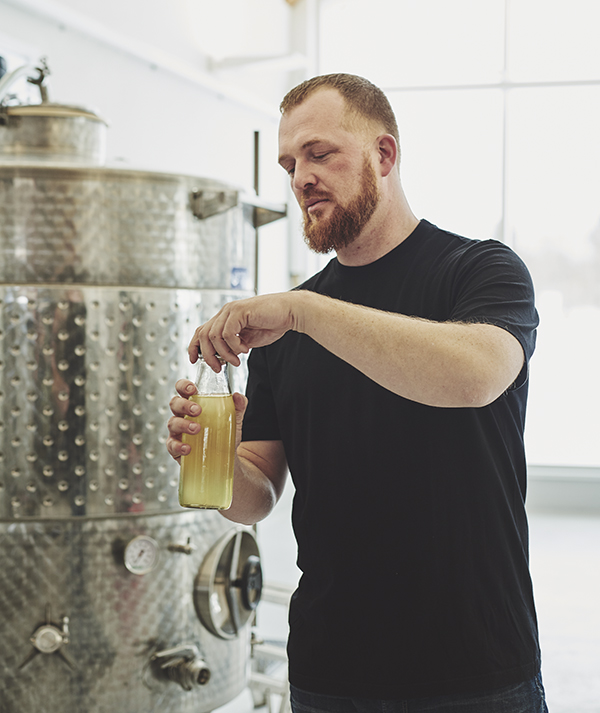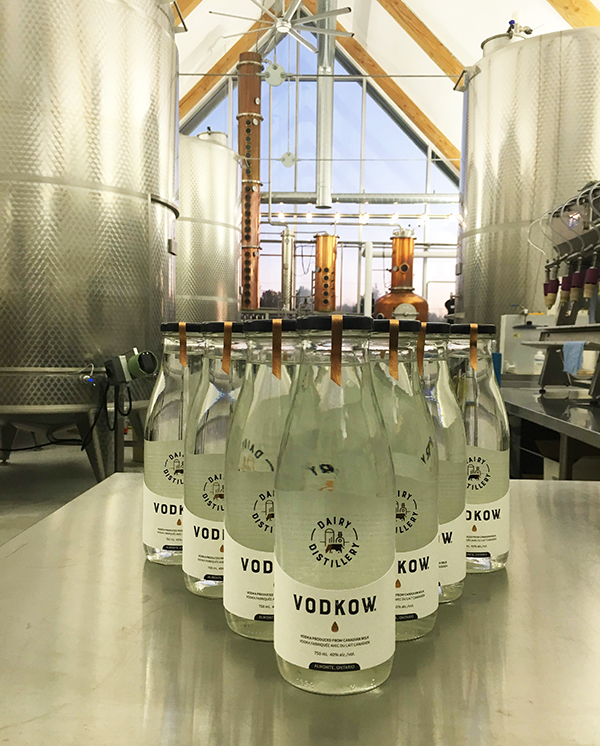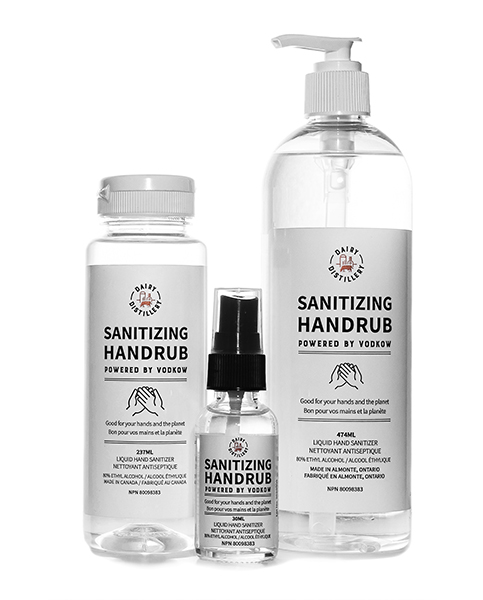
Political Science graduate Neal McCarten (BA ’09) has always been a big-picture thinker.
So when his business partner Omid McDonald first talked about starting a distillery, McCarten was ready with big-picture questions. Among his many queries, McCarten wanted to know what about the product would be interesting and different.
“I had always wanted to sell a product, or make a product, that I really loved and really believed in,” McCarten says.
The result was Dairy Distillery, a state-of-the-art micro-distillery in Almonte, Ontario, that marries tradition and innovation to create its flagship product, Vodkow. Different than most spirit products, Vodkow is made from milk sugars, a waste product from the milk filtration process. Because milk sugars are costly and difficult to dispose of, the production of Vodkow helps Canadian dairy producers.
Some of McCarten’s inspiration for creating Vodkow came from his aunt and uncle, who ran a dairy farm in Codrington, Ontario. McCarten says seeing the work his family members put in to running the farm was inspiring.

Neal McCarten at work in Dairy Distilley.
“I grew up spending the summers on their dairy farm watching how hard they worked,” McCarten says. “Ever since then, I always kind of dreamed of giving back in some way.”
McCarten’s time studying at Laurier also provided inspiration.
“In one of my history classes with Professor Blaine Chiasson, we learned that Genghis Khan made milk beer,” says McCarten. “That’s what the Mongols liked to drink. So this moment flashed up for me and we had this epiphany: we could take this skim milk that’s being thrown away and turn it into something useful.”

—
McCarten has a strong interest in the dairy farming industry, following trends in consumption and production across North America.
“People used to drink a lot more liquid milk,” he says. “Now they eat a lot more butter and cheese and ice cream, which takes the fat and leaves a lot more of the skim milk behind.”
To deal with excess skim milk, dairies created a product called “ultrafiltered milk.” The ultrafiltration process concentrates milk proteins, making cheese manufacturing more efficient and lowering transportation and storage costs for the concentrate. But the process also creates a waste product called permeate that can be harmful to the environment if not disposed of properly, with disposal costly for dairy producers.
Milk permeate is “just sugar, water and minerals, so it’s a lot like molasses for rum distillers,” says McCarten. “Dairies are trying to concentrate this waste and minimize the volume. It makes a perfect substrate for us.”
McCarten, McDonald and their team spent three years researching and setting up the Dairy Distillery facility. After receiving a $50,000 grant from the Canadian Dairy Commission, Dairy Distillery forged a partnership with the University of Ottawa, where researcher Jessica Gaudet worked to find a yeast candidate to create vodka using milk permeate. At the same time, the Dairy Distillery team worked on establishing the facility where the product would be produced.
“In total, it was almost three years before we opened the door and that was two Novembers ago,” McCarten says.
McCarten says people have a range of reactions when they learn Vodkow is made from a waste milk product.
“That’s one of the best parts,” he says. “You tell people we’re making vodka from milk and you often see them cringe. But when you tell them the story and pour them a sample, they leave thinking it’s a really great product. My favourite thing is just getting to show people that our product is coming from somewhere you wouldn’t expect.”
—
– Neal McCarten
Vodkow is currently available in more than 250 LCBO locations across Ontario and Dairy Distillery is distributing its product from British Columbia to Newfoundland and Labrador. But with the COVID-19 pandemic causing disruption around the world, the business was not immune to the uncertainty.
Before COVID-19 was declared a pandemic, Dairy Distillery was in full swing producing Vodkow and gearing up to release a new cream liqueur. Suddenly, the distillery was forced to stop its tours and tastings and, at the onset of the pandemic, it was unclear if the LCBO would remain open. McCarten says members of the Dairy Distillery team began to grapple with feelings of powerlessness against the enormity of the crisis. But they found a way to give back.

As the demand for hand sanitizer began to grow with the onset of COVID-19, Dairy Distillery made the decision to pivot to producing hand and surface sanitizers.
“Finding something useful to do in light of the pandemic has been really important for us,” says McCarten.
The Dairy Distillery is a small business and McCarten says size was an advantage in making the pivot required to produce sanitizer. The company was able to take almost 20,000 litres of finished Vodkow and distill it to 95 per cent purity to be used as sanitizer. It partnered with the Ottawa Hospital and City of Ottawa to distribute the sanitizer to frontline workers and community organizations.
“The truth is that some of the big companies just aren’t geared up to make a quick change,” says McCarten. “Being able to turn around and provide 20,000 litres of sanitizer during the first couple of weeks of the pandemic ended up being super useful to a lot of people.”
—
Despite the uncertainty due to COVID-19, Dairy Distillery recently introduced its newest product, a cream liqueur.
“It’s a little different than making a vodka where you’re basically stripping and making something as clean and pure as you can,” McCarten says. “There are a lot more variables and moving parts.”
McCarten says Dairy Distillery’s adaptable model and focus on innovation will help it weather whatever the pandemic brings. Still, he is eager for the day when in-person events can resume.
“It’s all just another challenge for us,” says McCarten. “It’s a constant reinvention.”